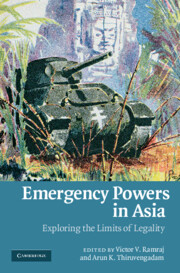Book contents
- Frontmatter
- Contents
- List of contributors
- Preface
- 1 Introduction: emergency powers and constitutionalism in Asia
- PART I Perspectives from legal and political theory
- PART II Postcolonial and post-conflict transitions
- 6 From Myanmar to Manila: a brief study of emergency powers in Southeast Asia
- 7 Discourses of emergency in colonial and postcolonial Burma
- 8 Emergency and Islamic law in Aceh
- 9 UNaccountable? The United Nations, emergency powers and the rule of law in Asia
- PART III Emergencies, executive power and constitutional order
- PART IV The role of the courts
- Index
- References
6 - From Myanmar to Manila: a brief study of emergency powers in Southeast Asia
from PART II - Postcolonial and post-conflict transitions
Published online by Cambridge University Press: 04 August 2010
- Frontmatter
- Contents
- List of contributors
- Preface
- 1 Introduction: emergency powers and constitutionalism in Asia
- PART I Perspectives from legal and political theory
- PART II Postcolonial and post-conflict transitions
- 6 From Myanmar to Manila: a brief study of emergency powers in Southeast Asia
- 7 Discourses of emergency in colonial and postcolonial Burma
- 8 Emergency and Islamic law in Aceh
- 9 UNaccountable? The United Nations, emergency powers and the rule of law in Asia
- PART III Emergencies, executive power and constitutional order
- PART IV The role of the courts
- Index
- References
Summary
Introduction
Constitutions are supposed to step in when men fail. But what happens when constitutions themselves fail, or, more ironically, if constitutional orders have in-built mechanisms for the total suspension of the rule of law? What happens when courts bow in the face of naked executive might? Does the law have a place in such situations, or is it all down to politics? Nowhere is this seen more graphically than in the case of emergency powers.
In most liberal-democratic societies, emergency legislation and the power of preventive detention are considered aberrations; a necessary but illegal intromission on the rule of law. British Prime Minister Winston Churchill called such a power ‘in the highest degree odious’. Scholars have thus often tried to deal with the emergency conundrum by reference to politics and executive prerogatives, and courts have dealt with it using the doctrine of necessity. But in Southeast Asia, states of emergency have been so common in the decolonisation period and its immediate aftermath that clauses empowering the executive to proclaim states of emergency as well as to issue emergency laws or regulations have been routinely incorporated into the constitutions of these societies.
In this historical account, I consider how the legal systems of the region have dealt with these questions since the time of their creation. While situations within Southeast Asia are varied and complex, ranging from a total collapse of law and legality as in the case of Myanmar, with little pretence of legality, to an American-style defence of the rule of law as in the case of the Philippines.
Information
- Type
- Chapter
- Information
- Emergency Powers in AsiaExploring the Limits of Legality, pp. 149 - 186Publisher: Cambridge University PressPrint publication year: 2009
